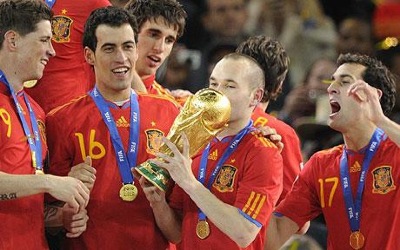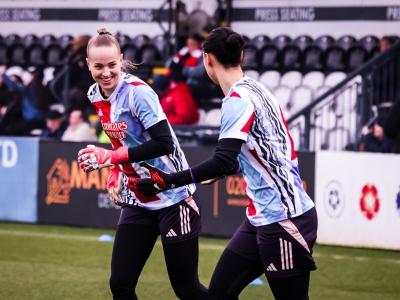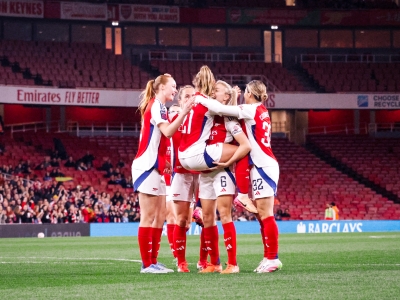My decision to root for Spain in the final was based ultimately on the belief that a player as cynical as Mark van Bommel should not be rewarded with a World Cup winner’s medal. Little in the 120 minutes of last night’s match did anything to convince me I had made the wrong decision. I had a feeling that Germany had played their best football already before Wednesday evening’s semi-final defeat to Spain. Also that Uruguay had not really met any top class teams until their elimination by Holland the night before. So, although a Germany v Holland final would have been tasty for historical reasons, it was only right that Spain made it. They have dominated the matches they have played – including their defeat by Switzerland - even if the goals tally has not been particularly remarkable.
World Cup Finals are rarely classic matches these days. The stakes are so high that caution inevitably rules the day for much of the encounter. The last really classic final I can remember was in 1986. The 2010 final was similar to many recent ones for the paucity of clear cut chances, although eventually fatigue meant that things opened up and if the game had started at 45 minutes, I think I’d have a very different view on it. Ultimately, the best team won, although the Dutch will recall Arjen Robben’s chance early in the second half as the moment the trophy slipped away. I was convinced he’d score, but the moment proved why Manuel Almunia has never been mentioned as even a remote contender for an international cap for his country. If Arsene Wenger needed evidence of what a difference a top class keeper can make, then he need look no further than this game.
Regarding Arsenal, the club were represented by a player on each side. Robin van Persie was largely starved of decent service, as Holland’s main tactic seemed to be for Robben to beat the offside trap. Cesc Fabregas came on five minutes before the end of normal time, could have scored himself, and ultimately provided the assist for the winning goal. He will be a big loss if Barcelona do find the money to fulfill his desire to move. It was an irony that the Dutch were complaining about a foul that wasn’t given in the build-up to the Spanish goal, given that they had flouted with the rules for much of the game.
Anyway, enough of the final, I intend to use this last offering to take a more general looks at the month of football in South Africa. I was interested to hear that one of the criticisms of the tournament from Mark Bright on the BBC was that not enough black faces were in the crowds. He estimated that about 10% of those present were black South Africans. I would have to say that this was not my experience, and that they formed maybe 20% of the attendees. He felt that more tickets could have been given away to locals for matches that had failed to sell out. In fact this did actually happen, judging by the number of schoolchildren I saw in uniform at some of the group games, specifically in Nelspruit and Rustenburg. It is an example of the media not always getting the full picture because they experience the tournament in a different way. Granted the ticket prices were more than most could afford, but the category four tickets reserved for South African applicants were as cheap as any World Cup ticket is ever going to be.
It has been said by a friend who wanted to attend the tournament but was unable to for financial reasons that he felt my view of the country was a little rose tinted. He highlighted the fact that people living in the most basic of squats in areas where visitors might see them were moved out for the duration of the tournament, so that the depravity of their lifestyles would not be witnessed. Although this is undoubtedly true, I think that the last thing the South African population wanted was for the more negative side of their country to be highlighted. There are certainly a lot of problems in the society, but the prevailing mood was that the place was hosting a month long football party and they wanted guests to have a good time. And in the spirit of positivity I found, I am not going to be the party pooper. I really feel that unless you were actually there, you cannot really get the full picture of the significance of this sporting event to the host country and why it mattered so much to South Africans that visitors formed a positive impression.
There is talk of what kind of legacy the tournament will leave. Certainly, some big stadiums that will rarely be full. But more significantly, internally, the improvements in infrastructure will benefit many – not least with the widening of some of the traffic choked roads. Externally, the reputation of the country as a place where danger is a constant should now be reviewed. Crime was certainly not the story of this tournament, as many feared.
There are a number of aspects of South Africa 2010 that will live in the memory. Chief of all is the vuvuzelas. You either love them or hate them, but as an in the flesh spectator, they certainly livened up some of the less entertaining clashes, of which there were a few. On occasion, the blowing became quite organized, producing a sound that cut across language barriers as visitors and locals alike blew together. It was communal and magnificent. The atmosphere created by the fans carried the tournament through many undramatic group stage matches, with a paucity of goals. Viewed from the UK on television, I am certain it was overall a disappointing finals.
The fact that there were very few high scoring matches and a prevailing attitude of caution in too many of the sides made for some turgid viewing. Many big name players failed to perform. You definitely got the feeling that for many, club football was more important. Certainly, the standard of football is higher in the bigger leagues than that which was witnessed in South Africa.
Although the early exits of France and Italy were a shock, the biggest surprise for me was the collapse of Brazil in the game against Holland. I was convinced Dunga’s side were the full package, but football’s ability to spring unpredictable results is what makes the game so compelling.
And of course, there was Paul the octopus. How I’d love Sky TV to announce they are ditching Jamie Redknapp and drafting in the eight-legged Weymouth-born expert. The latter would certainly provide greater insight.
I started this diary to give those not there a flavour of the tournament first hand. It’s the reason the entries dried up after my return at the beginning of July, before the quarter finals. Many thanks to all those who have emailed to say they enjoyed my offerings, and I can’t miss this chance to express my gratitude to the South African Gooners who were good enough to provide hospitality in their fine country – Harv, Ian, Martin and Earl.
While watching the final, my son asked me if there would be a final in 2084. I think he was trying to get his head round the final being held every four years or something. I worked out that 2082 and 2086 would be the actual dates nearest. It also gave me the chance to reflect that you can measure your life out by World Cup finals. There is no way I will be around for the 2082 tournament and a fair chance my son won’t be either. The first I remember watching was in 1974, so I’ve notched up ten finals now, being fortunate enough to physically attend matches in five of them. I doubt I will see another ten finals. Maybe six or seven. And that is one of the reasons I am always slightly mournful when another one ends. It is a marker of the years passing. The least we can ask for is for each World Cup final tournament to leave us with some great memories. I am pleased I went to South Africa as being there has left some great memories for me. South Africa 2010 might not have been a classic finals, but for me, it was a great experience, the kind that makes a life worth the living.







